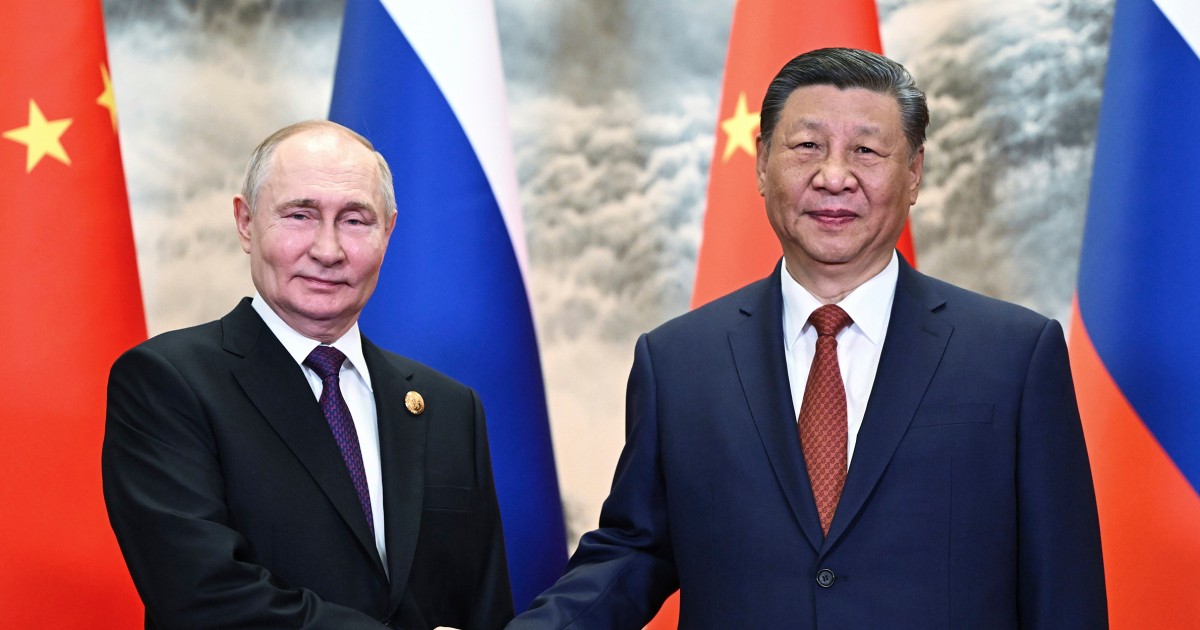Unveiling the Depths of Sino-Russian Relations: An Overview
The recent reaffirmation of partnership between Xi Jinping and Vladimir Putin marks a pivotal moment in Sino-Russian relations. As the world commemorates the anniversary of the Ukraine war, this declaration of a ‘no limits’ alliance raises critical questions about the future trajectory of global geopolitics. Both leaders are positioning their nations not just as allies, but as architects of a new international order that challenges Western hegemony.
The Genesis of the ‘No Limits’ Alliance
The term ‘no limits’ was first used by Xi and Putin during their meeting in June 2022, indicating a relationship that transcends traditional diplomatic boundaries. This alliance is not merely a response to immediate geopolitical pressures but is rooted in a complex tapestry of historical ties, economic interests, and shared strategic objectives.
Historically, China and Russia have experienced a tumultuous relationship, alternating between camaraderie and conflict. However, over the past two decades, they have forged a partnership characterized by mutual respect and strategic alignment. Key elements of this partnership include:
- Economic Cooperation: China has become Russia’s largest trading partner, with bilateral trade reaching record highs. This economic interdependence is crucial for both nations, particularly as they navigate sanctions and economic pressures from the West.
- Military Collaboration: Joint military exercises and arms sales have solidified their defense ties. Both nations view military cooperation as essential for maintaining sovereignty and territorial integrity.
- Political Support: On various international platforms, China and Russia have supported each other’s stances, particularly in the face of Western criticism regarding human rights and territorial disputes.
Implications for Global Geopolitics
The reaffirmation of Sino-Russian relations has profound implications for global geopolitics. As the West grapples with the ramifications of the Ukraine conflict, the partnership between Xi and Putin presents a united front that could reshape international alliances.
Challenges to Western Dominance
One of the most significant implications of this alliance is the potential challenge it poses to Western dominance in global affairs. As the U.S. and its allies impose sanctions and rally against Russia, China’s support provides Moscow with a lifeline. This dynamic fosters a multipolar world where power is distributed among various nations rather than concentrated in the hands of a few.
China’s growing influence in global affairs, coupled with Russia’s military capabilities, creates a formidable bloc that could challenge existing international norms. This shift is evident in various arenas, including:
- United Nations: China and Russia have often used their veto power to counteract Western initiatives, promoting a more balanced approach to international governance.
- Trade Alliances: The establishment of alternative trade routes and partnerships, such as the Belt and Road Initiative, reflects a strategic pivot away from Western-centered trade models.
- Energy Security: The energy trade between China and Russia is set to grow, with China increasing its imports of Russian oil and gas, thereby reducing reliance on Western energy supplies.
Regional Stability and Influence
As Sino-Russian relations deepen, the regional implications cannot be overlooked. Both nations share interests in stabilizing their borders and exerting influence in Central Asia, a region historically viewed as a sphere of influence for Russia.
China’s Belt and Road Initiative aims to enhance connectivity and infrastructure in Central Asia, while Russia seeks to maintain its influence through the Collective Security Treaty Organization (CSTO). The intersection of these initiatives presents both opportunities and challenges:
- Economic Development: Increased investment in infrastructure projects can lead to economic growth in Central Asian countries, fostering stability and reducing the influence of Western powers.
- Geopolitical Tensions: The overlapping interests may lead to friction, particularly as both nations vie for influence in resource-rich regions.
The Future of Sino-Russian Relations
As we look ahead, the future of Sino-Russian relations appears to be one of continued collaboration, driven by mutual interests and external pressures. However, several factors will play a crucial role in shaping this partnership:
Global Economic Shifts
The global economy is undergoing significant transformations, with emerging markets gaining prominence. This shift may lead to increased collaboration between China and Russia as they seek to capitalize on new opportunities while countering Western economic influence.
Technological Competition
As both nations navigate the complexities of technological advancements, cooperation in areas such as cybersecurity, artificial intelligence, and space exploration will be paramount. This technological alliance could position them as leaders in the next wave of global innovation.
Domestic Pressures
Both Xi and Putin face domestic challenges that could impact their foreign policy. Economic sanctions, public dissent, and regional instability may compel them to reassess their strategies. However, the mutual benefits derived from their alliance may outweigh these pressures, leading to a more resilient partnership.
Conclusion: A New Era of Sino-Russian Relations
In conclusion, the reaffirmation of the ‘no limits’ alliance between Xi Jinping and Vladimir Putin signifies a new era in Sino-Russian relations. As they navigate the complexities of global geopolitics, their partnership presents both opportunities and challenges for the international community. The implications of this alliance extend beyond mere political camaraderie; they signal a transformative shift in the balance of power, challenging the traditional dominance of the West.
As we move forward, it will be essential to monitor the evolving dynamics of Sino-Russian relations and their impact on global geopolitics, economic cooperation, and regional stability. The world is witnessing the emergence of a new multipolar order, and the partnership between China and Russia will undoubtedly play a central role in shaping its future.
See more BBC Express News

